Observations on FCC Staffing from the Plum Book
A ritual in DC every 4 years is publication of the "Plum Book" - which GPO produces with a plum colored cover showing they have a good sense of humor.
This book lists all the political jobs in the federal government and all the senior jobs that could be occupied by political appointees. While FCC staffing info is theoretically public information with respect to position title,job holder's name and salary, in reality this information is not readily available. But in the Plum Book we get a readily available snapshot that is illuminating. As a public service here is a link to the 3 pages that deal with FCC. From the FCC listings we can see how many senior positions there are at FCC, which are held by political appointees and which are held by career appointees.
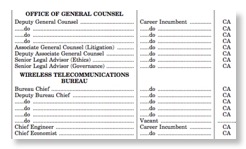
But then consider the following tweet from Chairman's Office official Gigi Sohn:
Applause for @mattdelnero as he leaves @fcc after a terrific tenure as Wireline Bureau Chief. pic.twitter.com/9pkwcNHsbX
— Gigi Sohn (@GigiBSohnFCC) December 15, 2016
A little further down in the Plum Book we see that Mr. DelNero is a "career incumbent" who is leaving FCC a little less than 3 years after joining it from Covington & Burling. What is going on?

While there are some that may be critical of everything the current FCC leadership has done, this involves a practice that has been going on for decades at FCC under BOTH parties.
The commissioners, their advisors, the senior managers in the Office of Media relations, and the chief of the Public Safety and Homeland Security Bureau are now political appointees and usually have been so in the past. The position of general counsel has nominally alternated back and forth between career and political over the years. My old boss at OET, Ed Thomas, chose to be chief of that office as a political appointee although he certainly was qualified for a career appointment due to his management and technical experience. Ed thought it would give him more prestige in dealing with political appointees at other agencies.
But most of the other bureau/office chiefs and some of their deputies are de facto political appointees who have been masquerading as career appointees and will leave in droves in the next few weeks. This masquerading has several "advantages" to the individuals involved:
- It gets around limits on the number of political appointees at FCC and allows the Chairman to stack senior managers with people who have unambiguous loyalty to him
- Career senior officials have to be vetted by OPM and committees of actual career civil servants for both job related skills and management experience. Some younger lawyers from private practice may not qualify under such standards
- Only career senior officials are eligible for special SES "performance awards"/bonuses of 5-20% of their normal salary, so having a career appointment has financial benefits
But this decades old bipartisan procedure has real downsides also.
- It discourages the development of an effective tier of top career civil servants who are politically neutral and act in the interests of the agency with loyalty to the current leadership. You say this is impossible? Consider Bob Pepper the chief of the former Office of Plans and Policy who held senior policy jobs and was a trusted advisor to chairman of both parties. OET Chief Julius Knapp has only served in that position under the current administration but has been widely viewed as politically neural during his long tenure as deputy in OET. It is hard to have such a career path at FCC now and as a result sometimes career civil servants are not as objective as they should be. Some may tell political people what they want to hear and some may secretly drag their feet on policies they disagree with. Both are inappropriate behavior for career civil servants and the fear of this is why political appointees want a thorough house cleaning.
- This system keeps much of the SES bonus pools away from real career civil servants where Congress directed it to go, further discouraging them.
- It results in large flux of senior managers with FCC chairman transitions. This is not just when the party in the White House changes. I recall a massive "career incumbent" shakeup when Chmn. Fowler left and was replace by Chmn. Sikes near the end of the Reagan Administration. This large group of senior changes decreases FCC productivity and effectiveness.
When my wife worked at NRC she reported no influx of political appointees masquerading as career civil servants into senior manage positions. NRC has a career civil service management structure that is loyal to the institution. More of this at FCC would probably help FCC effectiveness and allow the new leadership to have on hand a loyal and effective team to advise them and implement the desired policies.
Such a change cannot be implemented immediately because the current career civil servants have been affected by past practices, but I hope the next Commission will recognize the the large level of politicization of senior managers at FCC is really counterproductive. Once this problem is recognized it can start considering options for a slow and deliberate change in senior staffing and building up the skills of career civil servants to make FCC more effective.
Older Plum Books for comparison
2008
2012
UPDATE
Is it obvious to others why the bureau chief who deals with public safety should be a political appointee? It has been since this bureau was created so both parties have been behaving the same way. But does it really make sense?
.@FCC Public Safety Bureau Chief David Simpson says he will leave agency Jan. 20, same day as @TomWheelerFCC
— Howard Buskirk (@hbuskirk) December 21, 2016
Lessons on FCC Morale

This week the Best Places to Work in the Federal Government report was issued as it has been every year since the Bush 43 administration fostered the start of this program in 2003 and made surveys mandatory for Executive Branch agencies. FCC participation was optional and it dodged the survey until the 2009 survey - based on 2008 data collection during the Martin chairmanship. Now the purpose of FCC is not to amuse its staff and keep them happy. But enlightened management knows that you can get more done if everyone on the team understands goals and works in the same direction. Indeed, if they don't why have 1500-2000 people sitting around.
During my career at FCC Chmn. Michael Powell seemed to be the best leader at motivating the staff. Chmn. Kevin Martin, his immediate successor, the worst. Both Republicans. Most FCC chairs in recent history had essentially no management experience. They were generally Hill staffers or lawyers in private practice. Chmn. Wheeler despite other flaws, had at least directed 2 trade associations with a few hundred employees. Chmn. Powell did not have this direct experience, but he grew up in the family of a senior military officer and no doubt learned from his father how to be a leader of those in your unit. He also had been a junior military officer before his career was wrecked by a near fatal training accident. Having been a junior officer myself, I know that leadership training is a key part of preparation for commissioning. I doubt if many other FCC chairs have had comparable training.
So let's look at this year's results:

FCC had a dismal score during the Martin chairmanship as morale plummeted. This was particularly striking after the enlightened workplace leadership of Chmn. Powell. While Chmn. Genachowski was controversial for some of his policies, he at least made a wonderful turnaround in workplace morale at FCC.
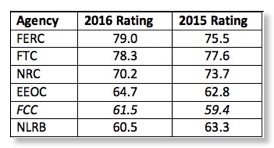
So I hope that the Transition Team in planning the new FCC leadership focuses on the positive accomplishments of Chmn. Powell in FCC administration and leadership and eschews the management style of Chmn. Martin, his successor. This is an independent issue of the 8th Floor harmony illustrated at left. Now partisanship in FCC is not totally independent of partisanship on the Hill so blaming Chmn. Wheeler entirely for this partisanship growth in FCC voting is not really fair. FCC is not really isolated from Congress especially when 3 of the commissioners are former Hill staffers and a fourth is the daughter of a key House member. Hill staffers make great commissioners, but there is a downside of having a near monoculture of such former staffers on the Commission.
So let's hope in the next few years we can have both good staff morale at FCC and better 8th Floor harmony too.
Hiring Irregularities at FCC During EB "Field Modernization"?
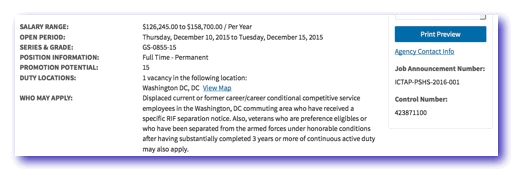
Readers know well that your blogger is not a big supporter of FCC 's "field modernization"/downsizing of spectrum enforcement staff. But this matter is now clearly res judicata as both the FCC commissioners, in a public meeting, and the relevant congressional committees have approved it.
But the very least that FCC could do for its long term field employees who are having their jobs eliminated is to treat them fairly with respect to vacancies in FCC that they could plausibly qualify for. Indeed, one might argue that FCC should go out of its way to accommodate displaced EB staffers in the hiring process by trying to save as many as possible and use their years of practical experience with telecom policy "outside the beltway" - but that would probably be expecting too much.
The job posting at the top of this item seems to indicate some hiring irregularities at FCC. While this is not unprecedented at FCC, it is especially grievous when dozens of long term loyal employees are about to be terminated.
A quick look at FCC's job posting page shows that vacancies normally have a 2 week open period. Now look at the GS-15 ($126,245.00 to $158,700.00 / Year) electrical engineer job given above. It is reasonable to assume that some of the displaced EB staffers have the proper qualifications for this position. Note that the open period is "Thursday, December 10, 2015 to Tuesday, December 15, 2015". I hear from a reliable source, but can not confirm, that this announcement was not visible on the hiring web page until Friday, December 11. Thus the actual one period was 3-4 work days, not the usual 2 weeks.
The notice the "who may apply section":
Displaced current or former career/career conditional competitive service employees in the Washington, DC commuting area who have received a specific RIF separation notice. Also, veterans who are preference eligibles or who have been separated from the armed forces under honorable conditions after having substantially completed 3 years or more of continuous active duty may also apply.
I originally took this to mean that EB field staffers displaced by "field modernization" were eligible and would be given some preference. However, multiple sources have now confirmed that no EB staffers "in the Washington, DC commuting area …have received a specific RIF separation notice" as of the open period here.
Mirage
It appears that the new posting is thus a cruel mirage for EB field staffers who are about to lose their jobs resulting rom "field modernization": it appears they might be given some preference, but in reality they are not eligible! While playing this trick on long term staffers it also appears that someone is trying to rig the job for a specific person who no doubt is a "veteran … who (has) been separated from the armed forces under honorable conditions after having substantially completed 3 years or more of continuous active duty" but may not necessarily be a current FCC employee.
As of today, there are 5 vacant announced positions at FCC.
Here is the ""Who may apply status" of each of today's FCC vacancies:
- Economics Research Assistant GS-7 "Current and former federal employees in the competitive service with reinstatement eligibility"
- Attorney Advisor GS-15 "FCC Employees"
- Program Analyst (Wireless Telecommunications) GS-12 "FCC Employees"
- Attorney Advisor (Field Counsel) GS-15 "All sources"
- Telecommunications Policy Analyst GS-15 "Displaced current or former career/career conditional competitive service employees in the Washington, DC commuting area who have received a specific RIF separation notice. Also, veterans who are preference eligible or who have been separated from the armed forces under honorable conditions after having substantially completed 3 years or more of continuous active duty may also apply."
Why are the position eligibilities above so widely varying?
Why is one legal position in DC restricted to only "FCC employees," while the other is open to any one?
Why does the Telecommunications Policy Analyst position have the same mirage condition as the engineer position at the top of the page that seems to restrict it in practice to veterans while the other one have nothing resembling this?
In this holiday season, I recall that 29 years ago I was called by the FCC HRM staff the last work day before the holiday and told to report to the HRM chief the first work day after the holiday. At that meeting I was handed the letter shown at left eliminating my position at FCC - probably in resulting from industry complaints over the controversial Docket 81-413 rulemaking that is the basis of today's Wi-Fi and Bluetooth. (No major corporation supported it and many strongly posed it.) I was theoretically entitled to take positions in FCC that I was qualified for.
It turns out FCC filled many such positions before the RIF letter was formally given to me and carefully made sure none were announced in the period immediately following. My lawyer documented these actions through a FOIA request and FCC management negotiated the compromise of my "exile" to the former Field Operations Bureau - predecessor of EB's field organization. During this exile, while ultimately lasted 6 years. The FOB staff was very welcoming and kind to me and together we developed several exotic spectrum enforcement techniques for catching satellite jammers and other criminal spectrum activity. I am grateful to my colleagues during this period and please to raise concerns about their possible mistreatment at this holiday season.
New EB Field Chief Announced in Low Key Way

Last Friday, Broadcasting & Cable's veteran reporter and Washington Bureau Chief John Eggerton posted an article entitled "FCC Names First Enforcement Bureau Field Director". The article begins:

FCC Enforcement Bureau Chief Travis LeBlanc announced Friday in an internal e-mail to staff that he plans to appoint the FCC's first ever Enforcement Bureau field director, Charles Cooper. Cooper comes from engineering consulting firm du Treil, Lundin & Rackley, where he was a partner and senior engineer.
Charles Cooper (2011)
Previously EB had announced that spectrum users with unresolved complaints "may contact the Field Director within 2 weeks after the period for the initial response". But only a few industry insiders were told who the acting field director was! (Actually it was also Mr. Cooper.) The policy also stated "Complainant may contact the relevant Regional Director within 1 week after the period for the initial response". For many years after EB was formed in the early 1980s from the former Field Operations Bureau, briefly renamed Compliance and Information Bureau, the phone numbers and e-mail addresses of field enforcement officials outside the Beltway were a closely held secret (even to non-EB FCC staffers) as all public contact was directed to the Call Center in Gettysburg. That changed a few years ago, but such contact information is really buried in the FCC's voluminous poorly organized web site. It certainly is not directly reachable from EB's home page.
Today, several days after the internal announcement and Mr. Eggerton's publication of the news and similar announcements in other publications, there is no word of this new appointment anywhere on the FCC or EB's website!
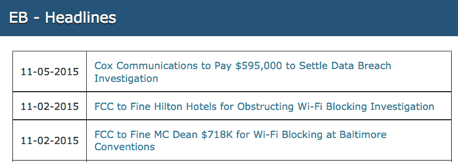
Headlines from EB homepage 11/17/15 10 AM
But does any of this surprise us when FCC never bothered to announce in 2013 that 2 senior official were getting the Presidential Rank Awards, a federal government-wide great honor for senior civil servants that had only been awarded 2 other times since 1978 to FCC staffers. So if the FCC has a million dollars to spend on consultants, perhaps they might also want to hire a consultant on how to motivate their staff more effectively by recognizing their accomplishments?
Here is a bio of Mr. Cooper dating to when he joined FCC a few years ago:
Prior to joining the FCC, Mr. Cooper has most recently been a Senior Engineer and Partner at the engineering consulting firm du Treil, Lundin & Rackley, where for twenty years he focused his engineering talents and expertise on communications issues and gained more than thirteen years of management experience. He is a Registered Professional Engineer, a former member of the Mississippi Air National Guard and Reservist, and a Cum Laude graduate of Mississippi State University. Mr. Cooper has performed and supervised many different types of communications projects including those in all of the broadcast services (AM/FM/TV/DTV). He also has experience inwireless, point-to-point microwave and land-mobile. He has served twice as president of the Association of Federal Communications Consulting Engineers.
Congratulations to Mr. Cooper on this appointment and our best wishes for success. Hopefully he can convince FCC leadership to give him the needed mix of personnel resources, overtime, travel funding, and equipment funding needed to do this key job. It would not hurt if key industry trade associations ask FCC leadership about the flow of resources to the remaining EB spectrum enforcement operation. Indeed, they might also want to talk to OMB and the congressional appropriation committees about the importance of adequate spectrum enforcement resources for their billions of dollars worth of Title III licenses.
What is FCC Doing to Help Displaced Long Term Field Employees
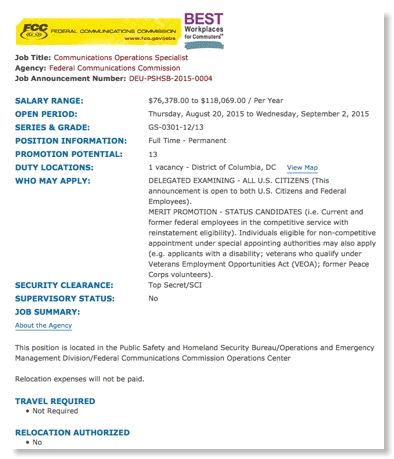
The above is a current vacancy announcement for FCC. As you can see at the bottom the posting does not authorize relocation for whoever is hired. This has been the general practice at FCC since the Fowler chairmanship in the 1980s. But FCC in the name of "field modernization" is about to layoff 44 field employees, most of them long term employees. A handful of field employees will keep their jobs but face downgrades — effectively demotions from the same change.
The field modernization is a decided issue that has been voted on by the Commission and we will no rehash it here even though we disagree. However, a separate issue is what to do now to implement it. It is reasonable to assume that some of the affected employees would qualify for this job opening in Public Safety & Homeland Security Bureau. Will they be given preference? Other agencies give preference to displaced employees. Will FCC?
If they apply and are selected will FCC pay relocation costs? (Former Managing Director Ed Minkel was remored to reject any selection for a posting who was eligible for relocation costs. Does his current successor have the same policy?)
Relocation costs of federal employees transferring to a new work station is allowed under Chapter 302 of the GSA Federal Travel Regulations. More specifically §302-1.1(b) says you are eligible for relocation costs if you are " An employee transferring in the interest of the Government from one agency or duty station to another for permanent duty, and your new duty station is at least 50 miles distant from your old duty station." Note that under §302-3.100 FCC can pay relocation costs for "employees separated as a result of reduction in force or transfer of functions who are re-employed within one year after such separation."
If "field modernization" is going to save FCC so much money, can't some of it be used to hire long term loyal employees who qualify for other positions in FCC? Should they be actively considered? Should they get a modest preference?
New Details of "Field Modernization"/Spectrum Enforcement Cutback
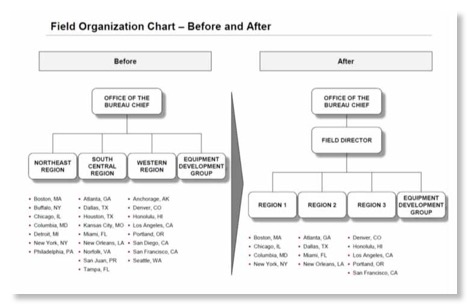
This week FCC notified its union, pursuant for federal labor relations laws, of the details of last week's "Field Modernization". We have posted the key documents for readers to review.
Some observations:
- Number of people affected: The present staffing level is 98 and the new one is 54 for a net loss of 44 positions. The 98 number includes no vacancies so this is a loss of 44 FCC employees, most of whom are long time employees.
- Three "bargaining unit" staffers will be downgraded/demoted from GS-14 to GS-13: 2 in Miami and 1 in LA. "Save pay" provisions will limit the salary impact but the salary impact will be real and negative for these 3 individuals.
- A few supervisors will also be downgraded/demoted but the details were not part of the notification to the union and are more difficult to deduce at this point.
- A new GS-15 Enforcement Bureau Field Director office is created with a GS-15 EE as "Field Director" and 3 lawyers as ""Field Counsel". Two of these lawyers are named and do not presently work in DC so it is unclear where these positions will be. The Field Director will be an awfully lonely position if his/her nearest colleagues are in Columbia MD.
- The Equipment Development Group in Powder Springs, GA shrinks from 10 positions to 7. This is the part of EB that develops new equipment and built special equipment. In the long term with a decrease in overall staff and number of offices there may be less equipment to build. But the only way to increase the productivity of field staff is to give them the right equipment to make them more productive as the consultant's report says. Various statements have been made about keep some of the savings from the staff cuts within the field to buy equipment, but the downsizing of EDG raises the question of whether this is credible.
- Equipment acquisition in EB (as well as in OET) has always been limited by the late availability of funds every fiscal year and excessive procurement bureaucracy. As a result usually only off-the-shelf equipment is bought, usually "riding" a DoD contract so the model options are limited. In order to get specialized equipment more procurement flexibility is needed and that generally means earlier availability of funding something that does not appear to be of interest at present to the FCC's Managing Director.
- t is unclear if FCC will pay relocation costs of any of the 44+ employees who are affected by these changes who qualifies for a position elsewhere in FCC. FCC since the Reagan era FCC has not budgeted for staff relocations even though it has staff "outside the Beltway". Indeed, former Managing Director Minkel (1980s) would cancel personnel postings if the person selected was legally entitled to relocation at FCC expense! Great way to help morale!

- Despite the promises to NAB to increase suppression of pirate radio stations there is not evidence this will happen or be sustainable. Pirates are generally not limited to the usual 40 hour work week and suppression needs availability of both overtime funding and travel funding - for those not conveniently near any of the remaining offices. In addition, since the creation of PSHSB aft 9/11 the entire 24/7 operation of FCC moved from EB to PSHSB and is only interested in off hour contacts dealing with safety-related issues not pirate broadcasters. Who you gonna call on weekend/evenings about a private station? Ghost Busters?
"Field Office Modernization" OR Spectrum Enforcement Cutback
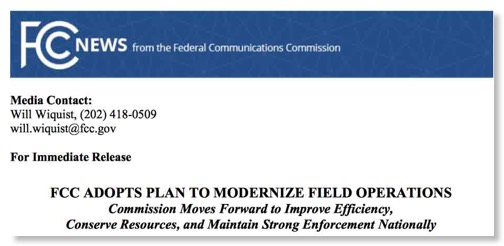
Yesterday FCC at a public commission meeting voted unanimously to
"modernize the agency’s field operations within the Enforcement Bureau. The proposal will improve efficiency, better position the agency to do effective radio interference detection and resolution and meet other enforcement needs, and save millions of dollars annually after implementation is complete."
The decision was in an Order that was adopted and released immediately. The Order states
The Field will embark on a program to update its equipment and employee skillset to address the likely issues that will accompany new and expanded uses of spectrum. This program will include the expanded use of remotely operated monitoring equipment to supplement field staff, as well as the identification and use of portable devices capable of assessing interference issues in bands expected to experience heavy spectrum use. Upon completion of all required implementation steps, the Commission will first apply the net savings resulting from this reorganization effort to this program, before applying those monies to the agency’s general fund. The net savings will not be used to increase the number of full-time non-field-related employees in the headquarters office of the Enforcement Bureau.
Now recall that TR Daily previously reported "FCC officials also have told stakeholders that the field operations would get the first shot at any money the FCC saves by closing field offices." So where are the savings going? Will there really be enough money after all these jobs are eliminated "to update its equipment and employee skillset"? While a statement has been made that savings can not be used to increase EB front office bureaucrats - comments were made at the commission meeting that EB front office bureaucrats have actually have increased significantly in the past few years - there is now little assurance it will actually go to equipment and training.
Paragraph 15 of the Order states "IT IS FURTHER ORDERED THAT all Enforcement Bureau field agents shall have electrical engineering backgrounds." Your blogger was educated and overeducated in electrical engineering. He has actually worked in spectrum enforcement. Focusing on academic credentials for such work is naive. Perhaps the intent was not to have non techies, but the skill set for solving spectrum enforcement problems in the field has little to do with most EE curriculums these days. Yes, some universities such as Virginia Tech, UCSD, NYU (now merged with "Brooklyn Poly"), and University of Texas-Austin have programs in wireless technology, but the vast majority of EE graduates have virtually no exposure to wireless technology, focusing on issues such as software engineering and semiconductor design and manufacturing. This coupled with the totally inept technical staff recruiting FCC has had for the past decade means less capability in new hires, not more. For spectrum enforcement, you need people who really understand spectrum issues intuitively. Let us go back to the MGM-produced WWII era film "Patrolling the Ether". When FCC wanted good agent then it hired ham radio operators. While having a ham license is not a perfect predictor of success, it is a better predictor of success than simply having an EE degree given the state of EE education in wireless issues now. One has to hire good people, not take short cuts in focusing on credentials!
For the past 3 decades, ever since Ed Minkel became the first Managing Director, FCC has avoided paying for personnel relocations. Will FCC pay for relocations related to this downsizing? For example, will staffers whose jobs are eliminated be eligible for FCC paid relocation to another office with a vacancy or to Washington if they are selected for a job there? We believe that the near total absence of FCC-funded relocations were both a major contributor to poor morale in field offices and has denied FCC headquarters of the historic flow of individuals with field experience and actual problems of licensees. The 2016 FCC Budget has only $55k for Budget Object Classification Codes 22, "Transportation of Things" and there is no indication of any budget for the subcategory "2210 Change of Official Station".
Finally a word to the GPS, aviation, and consumer electronics industries: Your trade associations, GPS Innovation Alliance, AOPA "Protecting your freedom to fly", Airlines for America, and Consumer Electronics Association were totally silent during the several month public debate on this downsizing that even under the best of circumstances will result in a lot fewer "boots on the ground". The broadcast industry, cellular industry, and public safety interests spoke up loudly during the deliberations on "modernization"/downsizing and as a result they got specific assurances that their interests would be attended to. Your industries were totally silent. Therefore do not be surprised to see the outcome of less spectrum enforcement on your industries may be much more severe than on those who spoke up!
- GPS: The GPDS industry is very susceptible to jamming sometimes called "privacy protection devices". FCC has the legal authority to both stop jamming and to stop the marketing of jamming devices. Will have the number of field agents and have the number of field office improve their capability?
- Aviation interests: The report that started this downsizing clearly stated that since FCC-enforced antenna marking and lighting issues have high compliance now less enforcement is needed. Fortunately aviation collisions into towers that are poorly marked, poorly lighted, or reported in incorrect locations are rare, but you know what the consequences of such collisions are! A lot of tower owners will know they are hundreds of miles away from the nearest FCC office and that the likelihood of marking and lighting enforcement has just decreased markedly. So why hire a tower caliber to replace that bulb? Fly carefully now!
- Consumer Electronics: FCC Rules serve to both limit interference and to create a "level playing field" for firms competing in the manufacture and sale of consumer electronics. In the consultant's report that lead to this downsizing, equipment marketing enforcement was never mentioned. So don't expect much in the future!
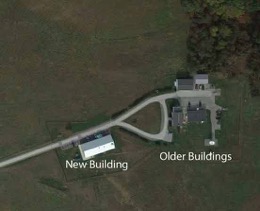
Comm. Rosenworcel on Hiring FCC Engineers
She made 5 predictions:
- Clearing more federal spectrum will be slow going unless we provide federal authorities with incentives to relocate.
- We will need to look high and look low to find spectrum for next generation wireless networks.
- Spectrum use will become more efficient if we challenge ourselves.
- We need more Wi-Fi.
- The government will do a better job of fostering innovation with an infusion of young engineers.
Readers will recall that the issue of FCC hiring of engineers and the difference between lawyer recruiting and engineering recruiting has been a recurring topic here. So it was gratifying to hear that the commissioner has very similar thoughts on engineering hiring at FCC as your blogger. We hope that others indicate to the 8th Floor support for Comm. Rosenworcel’s viewpoints for the benefits of all regulated industries. Of course if you prefer that technical proceedings be dominated by lawyers and drag on forever, feel free to support the status quo.
Engineers are deployed throughout the government. At the FCC we have more than 250 of them. They are an integral part of our team, and their input is absolutely vital on spectrum policy.
But I think that across government it is time for a fresh infusion in our engineering ranks. Think of it as a new Americorps, an engineering corps that can modernize the work of government and open opportunities for innovation.
That’s big. So let me start closer to home. Over the past several years, the FCC has been able to recruit talented, young legal professionals through an honors attorney program. In fact, one of the alumni of this program—David Goldman—works in my office and is just the kind of professional we want to recruit to public service.
I think the program that brought David to the FCC needs an engineering counterpart. So I think we should create an honors program for young engineers. It would bring new vigor to the ranks of our technical experts. By mixing young men—and women—with experienced engineers already on staff, the FCC could be better prepared to face the challenges of next-generation communications networks.
FCC Morale Continues to Improve According to Survey

Long time readers will recall that the Best Places to Work in the Federal Government program has been a recurring theme here. This was a Bush (43) Administration initiative that was ignored by the FCC leadership during that period. Since morale was high during the Powell chairmanship that is puzzling, but it is clear why the Martin chairmanship did not want any attention on employee attitudes.
FCC started participating in the 2009 survey and it is clear that there is a strong positive trend even though government-wide scores are decreasing:

FCC is considered a “mid-size agency” and now ranks 7 out of 23 such agencies. FCC was singled out for special praise this year in the report:
The Federal Communications Commission (FCC) is the most improved mid-size agency in the 2013 Best Places to Work in the Federal Government® rankings, moving from 10th of 22 agencies to 7th place out of 23.
The FCC, which regulates interstate and international communications by radio, television, wire, satellite and cable, has a Best Places to Work job and workplace satisfaction and commitment score of 71.3 out of 100, an increase of 4.6 points since last year.
In addition to increasing its overall score, the FCC improved employee satisfaction in seven of the 10 separate workplace categories that were measured.
The biggest gain was a 4.7-point increase in strategic management, which measures the extent to which employees believe management ensures they have the necessary skills and abilities to do their jobs. The FCC also jumped 3.8 points in its effective leadership score, which measures the extent to which employees believe leadership generates motivation and commitment, encourages integrity and manages people fairly.
My wife’s former employer, the Nuclear Regulatory Commission, used to be #1 government wide, but is now tied for 4th and is only slightly ahead of FCC in the mid-size category. FDIC with a score of 82.3 is the clear leader in the mid-size category, but #2 - #7, the group that includes FCC, has a relatively small spread in score between 77.2 and 71.3 . (In all fairness, FDIC is not your standard federal agency as it receives no appropriation and is supported directly by bank insurance fees. I believe that it has more discretion for internal spending that more normal agencies and thus may account for its higher score.)
Congratulations to the FCC leadership for continuing the improvement in employee morale and let’s hope they beat NRC next time!
UPDATE
Actually a non-update. In view of the nice words said about FCC in the report that are quoted above and its recognition of FCC’s as “most improved mid-size agency”, we are surprised there is no mention of the report on the FCC’s home page or its blog as of today 12/19/13.
UPDATE 2
A January 2, 2014 Washington Post article entitled “Tips from federal agencies with happy employees” has this additional information:
The Federal Communications Commission (FCC) also made positive strides, winning the ‘Best Places to Work’ most improved mid-size agency award in 2013, and moving from 10th out of 22 agencies to 7th out of 23 in the rankings.
After studying the federal survey used to compile the ‘Best Places to Work’ rankings, the FCC placed added emphasis on finding ways for management to better communicate with its more than 1,700 employees. The stepped-up communications included emails from the chairman and town hall meetings in various bureaus to highlight what the commission is doing and the valuable role played by employees. During performance reviews, managers also have talked about the importance of the mission and their workers’ contribution.
Oddly, as of the date of this article FCC has never said anything on its website or blog about this award. But then again, as we have written, FCC may just have an odd view to all awards!
Awards@FCC: Odd Ways of Recognizing Staff Excellence Continue
Long time readers may recall that FCC recognition of staff excellence has been a recurring topic here. For example in an August 2007 post we discussed how the Senior Executive Service bonuses that are an integral part of the compensation package for senior managers at FCC have become hidden even though they were public at other agencies and were very visible during the Fowler chairmanship in the 1980s.
We also pointed out that the Presidential Rank Awards, another integral part of compensation or senior federal managers have been rarely given at FCC since they were created in 1978. Until this year the only 2 FCC executives to be so recognized were James McKinney, former Chief of the Broadcast Bureau, and Jerry Vaughan, former Deputy Chief, WTB and a key figure in organizing the first spectrum auctions. (Mary Beth Richards who has worked several times at FCC received this award from the Federal Trade Commission for her work there before returning for another stint at FCC.)
Thus we were surprised to piece together recently the unannounced news that 2 key senior FCC staffers received the presidential rank awards, only the 3rd and 4th in 35 years, without any public announcement by FCC. Both are well deserved honors to long serving distinguished contributors to the FCC’s mission. FCC is now reviewing its administrative practices and has been “soliciting public input on improving the efficiency of how we conduct business here at the FCC”. We hope that the issue of award transparency will be considered in this review. The FCC blog recently stated
We hope readers respond to this call and ask for more effective recognition of outstanding work by career civil servants.“We plan to remain engaged with the public on ways in which the FCC can be more efficient and effective, and we encourage you to continue to submit your ideas to innovation@fcc.gov. We are always open to your thoughts and ideas.”
While the FCC made no announcement of these awards, here is a statement from Rep. Anna G. Eshoo that was in the May 16, 2013 Congressional Record:
OET Chief Julius Knapp

Last month, Julius Knapp, Chief of the Federal Communications
Commission's (FCC) Office of Engineering and Technology and a dedicated
agency employee for nearly 39 years, received the Distinguished
Executive Presidential Rank Award. This award recognizes Julius for his
ongoing work to unleash new technological innovation.
OSP Senior Economic Advisor Evan Kwerel

Mr. Speaker, I ask the entire House to join me in congratulating Julius Knapp and Evan Kwerel on receiving these very special awards and
for their dedicated years of service to the Federal Communications Commission and to the people of our nation whom they have served in an
exemplary fashion.
Now perhaps there was an understanding in the Administration to not announce these awards officially for some reason, although lists of the awardees were obtained by various newsletters. In addition, DOE, Air Force, and Army have announcements on their own websites about their awardees.
At the Commission’s September meeting, the almost annual Excellence in Engineering Awards were given out. In a November 2010 post here entitled “FCC Excellence in Engineering Awards: The Continuing Inattention to Publicizing Excellence” and a March 2008 post entitled “Excellence in Engineering: Why the Secrecy at FCC?” we pointed out the lack of information about these awards and how the analogous Excellence in Economic Analysis awards have often been better publicized. Well this year both awards got no public announcement other than what was said at the meeting. For the record here are this year’s winners. First 2 individual awards and then 2 team awards:
- Janet Young (WTB) - for work on PCS H Block Proceeding
- Timothy Harrington (OET) - for work on technical standards for cellular boosters (Docket 10-4)
- John Healy, Julia Tu, Michael Caiafa, Jerome Stanshine (PSHSB) - for report on derecho storm’s impacts to communications
- Gary Westby and Gregory Cunningham (EB-Detroit) - for study of how to measure power flux density in 700 MHz band at US/Canada international border
Our congratulations to all the awardees mentioned above for their contributions to advancing the telecom industry through dedicated public service. Let’s hope that in future years FCC doesn’t have to wait for bloggers to ferret out such news of staff excellence and contributions to the telecom community.
FCC Hiring: Why is recruiting of lawyers so different than for engineers?
The recruiting of lawyers at the beginning of the Fall term is a long standing tradition at FCC that has been discussed here before. The only way to get the best people is to go when recruiting of the graduating class starts. Yet for engineers, recruiting must always wait until the budget is finalized which in the current political environment is in the Spring. Indeed, this year FCC did not even officially announce jobs for entry level engineers until May! While it is necessary for FCC managers to say they have hired great engineers, it is clear that the pickings are pretty slim if you wait until late in the school year to even look.
On the webpage for the FCC lawyer recruiting program it states
“Specific placements within the agency will be based on the participant’s interests and experience and the needs of the FCC. Participants may have the opportunity to rotate to a new assignment within the agency at the end of their first year. During their two years in the Honors Program, attorneys also will be afforded professional and educational opportunities designed specifically for Program participants.”
While I worked at FCC I repeatedly pushed for an analogous rotation program for entry level engineers. It was specifically rejected because the bureau chiefs who employ engineers are interested in their near term problems which are generally processing delays for various types of licenses and view entry level engineers as “cannon fodder” to fight such processing battles. The concept of development of staff engineers for future work in policy areas is not on their mind.
Note that the Nuclear Regulatory Commission explicitly offers rotations for entry level hires in both engineering and legal fields. The National Security Agency, reportedly the government largest employer of electrical engineers, offers new employees various types of career development to both attract good applicants and enhance their careers.
When I joined FCC, the headquarters engineering staff included some individuals who had started in the old FOB (now EB) in enforcement field offices who had solved real problems “outside the beltway” and knew the operational aspects of the telecom industry. In myopic budgeting decisions this has become very rare because FCC now jumps through hoops to avoid paying any relocation costs for personnel and has essentially told field personnel not to expect a job in DC unless they agree to not ask for any relocation costs. James McKinney, Carlos Roberts, and Dick Smith are all FOB field alumni who moved to DC and became bureau/office chiefs. This lack of mobility both hurts recruiting and hurts engineering staff development.
When I was on active duty in the Air Force at the end of the Viet Nam War, I was puzzled why the Air Force was forcing people out to downsize at the same time it was recruiting new entry level enlisted men and officers. I asked a wise old colonel I worked with and he explained it very simply and clearly: The US Air Force will be around 10 years, 20 years and more from now at some size that is hard to predict. It will always need a mixture of people with differing years of experience and differing ranks. If you turn off the entry spigot or get the wrong people, than years into the future there will be major staffing problems.
That is problem with FCC. Staffing people look at near term goals not long term institutional needs. I do not know how big FCC will be in 2020. I do not know how many engineers it will need in 2020. But I do know that FCC, or any organization that might replace it, will need a mixture of high quality engineers with a mix of experiences.
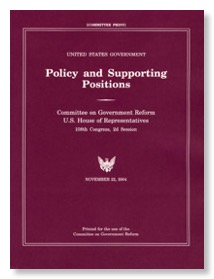
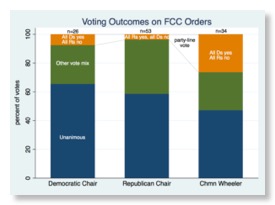

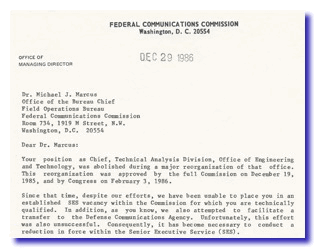
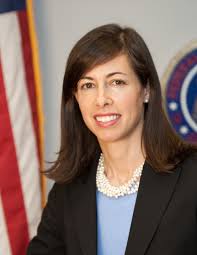
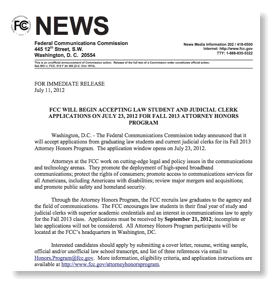



![Validate my RSS feed [Valid RSS]](valid-rss-rogers.png)

